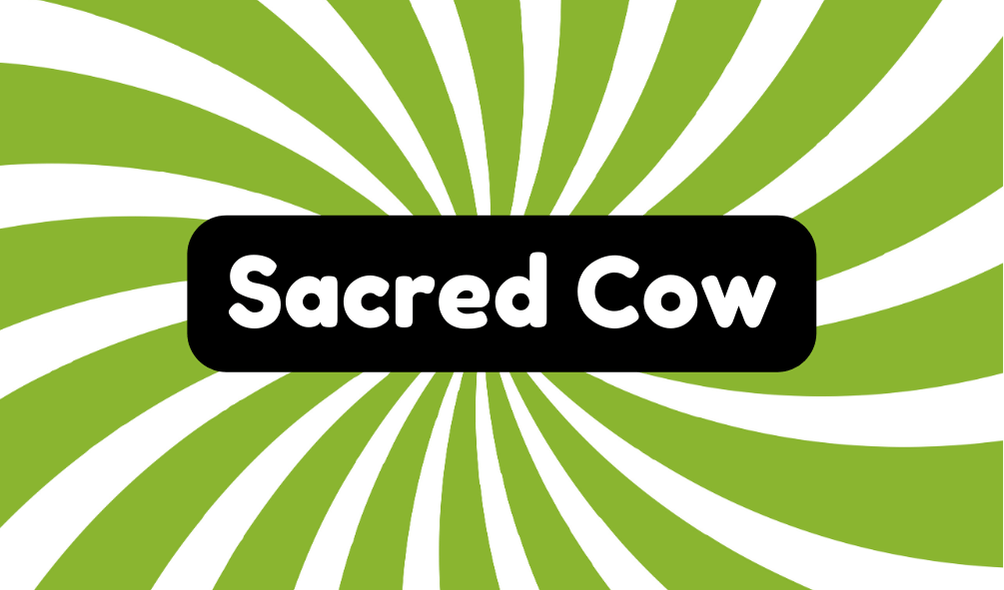The term "sacred cow" describes ideas or practices that are considered untouchable and immune from criticism, often limiting essential discussions. It originates from Hindu beliefs, where cows symbolize life and motherhood, reflecting deep cultural respect. In American English, the phrase gained popularity in the 1800s to highlight concepts people resist challenging, like outdated traditions or ineffective policies. For example, you might say, "Protecting sacred cows in education stifles reform." Understanding this term reveals the complexities of social norms and values, prompting necessary examination of what really deserves such reverence. You'll discover more about its implications as you explore further.
Synonyms
When considering the term "sacred cow," a few synonyms can come to mind that capture its essence. These terms highlight the idea of a sacred belief or cultural taboo that remains unchallenged, often evoking mixed emotions. Understanding these alternatives is vital for grasping the concept more deeply. Here's a quick list of synonyms:
- Untouchable: Something regarded as too significant to criticize.
- Immunity: A state where certain ideas are shielded from scrutiny.
- Taboo: An area deemed socially unacceptable to question.
These synonyms underscore how sacred cows can create barriers to innovation. By recognizing and reflecting on these concepts, you can better navigate spaces where critical thinking is essential for progress.
Example of Sentences
To illustrate the concept of a sacred cow, consider the following examples that highlight how certain beliefs or institutions are treated as unquestionable:
- "The journalist esteemed too many sacred cows, leading to necessary yet uncomfortable debates."
- "The old government program has become a sacred cow, often ignored despite its flaws."
- "Christianity is a sacred cow among many people, showing the cultural significance tied to unchallengeable beliefs."
These sentences reveal modern implications of sacred cows, demonstrating how deeply ingrained ideas resist scrutiny. They remind us that while some beliefs hold cultural significance, they can also hinder progress. By understanding sacred cows, we can boldly question the untouchable and foster innovation in conversation, promoting a more open society ready for change.
Origin
Originating from Hindu beliefs, the concept of a sacred cow refers to the reverence for cows, which are not only valued for their milk but also hold a symbolic place in society. In Hindu tradition, cows embody life and motherhood, leading to strong cultural reverence that promotes their protection. This belief may seem outdated to some, yet it mirrors societal values around respect for certain ideas. Curiously, similar sentiments can be found in Jewish traditions against mixing meat and dairy. As the term evolved, its usage in American English traces back to the 1800s, representing anything deemed untouchable. In a world craving innovation, it's essential to recognize the tension between tradition and progression as we question these sacred notions.
Collocations
Collocations related to the term "sacred cow" often highlight how certain beliefs and institutions become entrenched in society. These phrases emphasize the sacred cow symbolism that often shields ideas from scrutiny. You might encounter expressions like:
- "protecting sacred cows"
- "challenging sacred beliefs"
- "sacred cows in politics"
These collocations reveal a critical reflection on how dearly held traditions can stifle progress and dialogue. By protecting these ideas, you might unintentionally hinder innovation and necessary change. While some beliefs deserve respect, others require us to challenge their untouchable status. Acknowledging this tension can push conversations forward and foster a more dynamic understanding of societal norms, ultimately allowing for growth and transformation in thought and practice.
How to Use in Everyday Language
Using the term "sacred cow" in everyday language can be impactful when discussing topics that seem beyond reproach. This phrase helps highlight ideas or practices people protect without question, often stifling innovation. When you mention sacred cow impacts, you're calling attention to how these unquestioned beliefs can hinder progress. It's essential for you to become skilled in maneuvering around sacred cows, especially in discussions about change. Phrase your thoughts to encourage reevaluation; for instance, challenge why a certain tradition continues unexamined. Critically questioning these 'sacred cows' can open doors to fresh perspectives, enabling more innovative solutions. By doing this, you'll foster a culture where questioning is welcome, rather than discouraged. Remember, progress often requires challenging the status quo.
Why Is It Still Relevant Today?
Many people still confront sacred cows in various aspects of life today, as these unquestioned beliefs continue to shape societal norms and practices. Understanding their cultural relevance is essential, particularly in addressing modern implications. Sacred cows stifle innovation and critical thought, making it crucial to examine them closely.
| Belief/Institution | Cultural Relevance | Modern Implications |
|---|---|---|
| Traditional Education | Seen as fundamental | Needs reform to adapt |
| Social Norms | Enforces conformity | Can limit diversity |
| Political Systems | Viewed as untouchable | Calls for transparency |
| Health Practices | Respected traditions | Demand for evidence-based alternatives |







